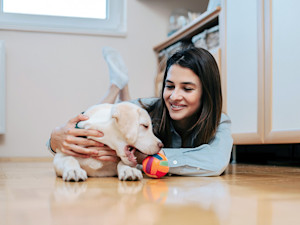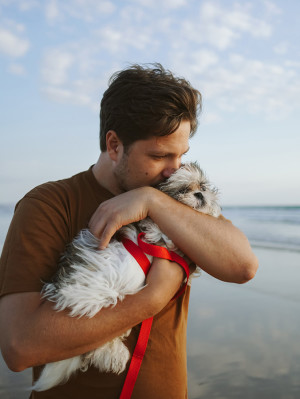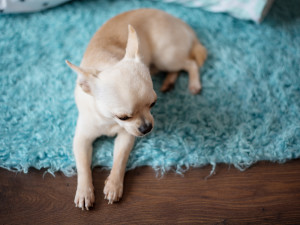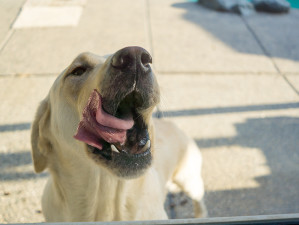How Long Does it Take to Potty Train a Puppy?
If anything requires patience, it’s this

Share Article
In this article:
Average Time to Potty Train a Puppyopens in a new tab How to Potty Train a Puppy Fast opens in a new tab Factors That Affect How Long Potty Training Takesopens in a new tab Potty Training Techniques and Toolsopens in a new tab Frequently Asked Questionsopens in a new tab
Bringing home a puppy is one of the most exciting things you’ll ever do, but it does come with few responsibilities from the start. One of those big hurdles is potty training. It seems like a big task, but it’s one that you will need to take day by day, which only makes things easier.
Here’s everything you need to know about potty training your new puppy.

littleKin™ is Kinship’s home just for puppy and kitten parents. Bop over to check out expert advice, new pet tools, and special deals—all curated for your newest family member.
opens in a new tabAverage time to potty train a puppy
Potty training a puppy typically takes between four to six months, though some puppies may take up to a year to be fully trained. Consistency, positive reinforcement, and patience are key factors in the training process.
Potty training a puppy can be a daunting task, and you must be ready for the challenge. To potty train a puppy be prepared to be consistent and patient. Just like every human is different, so is every puppy, so there is no set amount of time it will take you to potty train your puppy. You can do a few things to ensure potty training goes off without a hitch and is as stress-free as possible for you and your puppy.
Factors that affect how long potty training takes
It’s important to know that the younger the puppy you have, the more frequently you will need to take them out. You may also need to start with frequent toilet breaks. Typically, a puppy can hold their bladder for the number of months they are plus one (a three-month-old dog should be able to hold it for four hours, if sleeping or during a time of low stimulation).
This rule does not apply when your puppy is up and about, moving and grooving. While your dog is learning the rules of potty training, be sure to take them out immediately after they have eaten, played, or have woken from a nap. If you do that, you will easily prevent several accidents over the day.
When beginning your training journey, be sure to pick a pee spot; this is important because it builds consistency and helps your dog understand when you go to this spot outside, they pee. If you take your puppy out to go to the bathroom and allow them to pick their own spot, you will create a bad habit. Your puppy will have to find the ‘perfect’ spot to do their thing.
At times, this can cause your puppy to take a long time to actually go, and this causes a problem when you are in a rush to leave. By selecting a specific potty spot, your puppy will learn: when my parents bring me here I need to wee.
How to train a puppy fast
Once you have your toilet spot picked, it is helpful to get on a schedule (on top of taking your puppy out every time they eat, wake up and play, etc). Depending on the age of your puppy, you will want to start by taking them out every 30 minutes to an hour. When your puppy pees in their designated weeing spot, reward them with a yummy treat.
Set a timer each time you go back inside; this will help keep consistency with your schedule. Puppies learn best when they fall into a successful loop: the more toilet breaks you catch outside and reward for, the faster your puppy will begin to understand. As your puppy becomes more successful you can increase the time between each toilet break. The fewer accidents your dog has the faster potty training will go for you and your pup!
Potty training techniques and tools
Did you know you can teach your dog to use the bathroom on cue? Each time your puppy pees, say, “toilet”. Repeat this cue as soon as your puppy starts peeing, and repeat it a few times while they are going, do this for a few weeks. As you get to know your puppy, you will get familiar with what they do right before they pee. Once you know the precursor you can say, “toilet” before they start. Over time, you will be able to walk to the bathroom spot, say, “toilet” and your dog will automatically go.
So, what should you do if your puppy has an accident? Accidents are bound to happen. How you handle them will make or break potty training for your puppy. Never scold your puppy for having an accident. When you yell at your puppy for an accident, they think you are yelling at them for peeing or pooping in general.
This will result in a puppy who still has accidents in the house but hides them from you. When your dog has an accident, don’t make a big deal about it; just nonchalantly go over and clean it up. It can be helpful to crate your puppy when you can’t watch them; puppies do not typically like to soil the area they sleep in. So, if you need a minute, just put your puppy in their crate. That way, an accident won’t happen when you are busy. If you catch your dog mid-urination in the house, try to calmly interrupt them and get them outside ASAP to finish their business, remembering not to get frustrated with them.
The size of your dog can also play a part in how quickly your puppy potty trains. The smaller the dog, the smaller the bladder. If a small dog is drinking a lot of water, they may need to use the bathroom more often which could cause more accidents when they are first learning.
Now that you have all of this information, it is time to put it to the test. Remember the key to easy potty training is: more successful attempts than accidents, yummy treats, timing and consistency.
FAQs (People also ask):
When should I start potty training my puppy?
You should start unofficially potty training your puppy as soon as you bring them home. Puppies under 10 weeks old can’t typically hold their bladder for longer than 30 minutes, so they need to go outside when they wake up, when they eat, after they drink, after they play, etc.
How can I potty train my puppy in a flat?
While pee pads are a good idea to have around an apartment in case of an accident, it’s still best to take your pup out as often as possible to get them used to the fact that they pee outside. While this may be annoying in a flat with no outdoor space, remember these frequent trips won’t be forever.
Should I use a bell to potty train my puppy?
A helpful trick to teach your dog when potty training is ringing a bell. You can train your dog to ring a bell when they need to use the bathroom. This is very helpful as you and dog will be able to ‘communicate’. Just be sure not to let your dog abuse the privilege of ringing the bell to go outside and play.
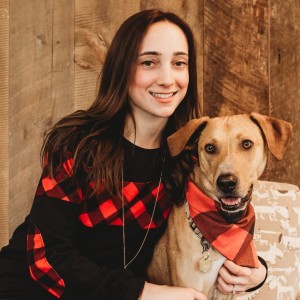
Danielle Vrabel, CPDT-KA
Danielle Vrabel is a dog trainer who earned her CPDT-KA in 2020. Danielle is a proud pet mom of five pets: two dogs, two cats, and a corn snake. Danielle has fostered over 10 dogs and 15 cats/kittens as well as helped train shelter dogs before they are adopted. Both of Danielle’s dogs are pet therapy dogs, where she also volunteers her time helping evaluate future therapy dogs.
Related articles
![woman lying on floor hugging lab puppy playing with ball]() opens in a new tab
opens in a new tabHow to Toilet Train a Puppy in a Flat With No Outdoor Space
Just ’letting them out in the garden’ isn't an option for everyone, especially in this economy
![Young man cuddling little white shih tzu puppy by the Atlantic Ocean.]() opens in a new tab
opens in a new tab9 Myths About Your Puppy – Busted By a Behaviourist
The internet has a lot to tell you about your new addition. Here’s what’s actually true
![Tan Chihuahua dog laying on aqua rug looking down shamefully]() opens in a new tab
opens in a new tabWhy Is My Adult Dog Weeing In the House?
How to re-housetrain a dog of any age
![Labrador retriever licking their lips]() opens in a new tab
opens in a new tabWhy Do Dogs Eat Poo?
What to do when your dog has questionable tastes
